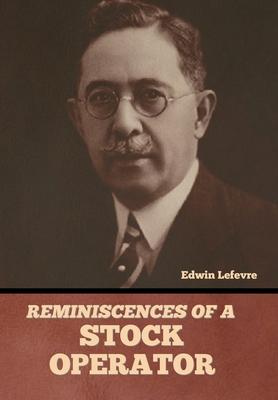Reminiscences of a Stock Operator is a 1923 roman clef by American author Edwin Lefvre. It is told in the first person by a character inspired by the life of stock trader Jesse Livermore up to that point.
The book can be divided into three parts:
1890-1910: Livermore was able to make easy money by taking advantage of the bid-ask spread on inactive stocks with leverage of 100-to-1 at bucket shops.
1910-1920: Livermore was a stock trader on the New York Stock Exchange, where he went boom and bust several times using high leverage.
1920s: Livermore engaged in market manipulation which was not illegal or without precedent then, charging fees of 25% of the market value of the manipulated stock. This was before the creation of the U.S. Securities and Exchange Commission in 1934.
In his 2008 book, The Age of Turbulence, Alan Greenspan called the book "a font of investing wisdom" and noted that quotes from the book such as "bulls and bears make money; pigs get slaughtered" are now adages.
A March 2005 article in Fortune listed it among "The Smartest Books We Know" about business.
In Market Wizards by Jack D. Schwager, many investors, including Richard Dennis, quoted the book as a major source of material on stock trading. (wikipedia.org)
About the author:
Edwin Lefvre (1871-1943) was an American journalist, writer, and diplomat, who is most noted for his writings on Wall Street business.
Of the eight books written by Edwin Lefvre, his Reminiscences of a Stock Operator is considered a classic of American business writing. The book began as a series of twelve articles published during 1922 and 1923 in The Saturday Evening Post. It is written as first-person fiction, telling the story of a professional stock trader on Wall Street. While published as fiction, generally, it is accepted to be the biography of stock market whiz, Jesse Livermore. The book has been reprinted in almost every decade since its original publication in 1925, the latest put out by John Wiley & Sons in hardcover and a paperback edition in 1994 that remains in print. It has been translated into the Chinese, German, French, Polish, and Italian languages, amongst others. A George H. Doran Company first edition, even in fair condition, may sell today for more than a thousand dollars. In December 2009, Wiley published an annotated edition that bridges the gap between Lefvre's fictionalized account and the personalities, exploits, and locations that populate the book. Page margins notations in the 2009 edition explain the historical setting and the real companies, individuals, and news events to which Lefvre alludes.
In 1925, Lefvre authored a second book about a stock trader, a factual biography with the title The Making of a Stockbroker. This book was about John K. Wing, a senior partner of Bronson and Barnes, a major Boston stockbrokerage, whose approach to the business provided a contrast to that of Jesse Livermore, the veiled subject of his earlier book.
On his death in 1943 (aged 71-72), Edwin Lefvre's estate in Dorset, Vermont (near Manchester) was passed to his widow. Built about 1820, it was the first home in the United States made with marble quarried right on the property. Their eldest son, Edwin Lefvre, Jr. (b. 1902), who also worked on Wall Street, inherited the home and completely restored it in 1968 when he retired there. Now it is listed on the National Register of Historic Places. Their second son, Reid Lefvre (b. 1904), was the founder of the traveling carnival known as the "King Reid Show" and a politician. He was elected to the Vermont General Assembly, serving as a member of the House of Representatives from 1947 to 1959 and the state Senate from 1961 to 1963. (wikipedia.org)
